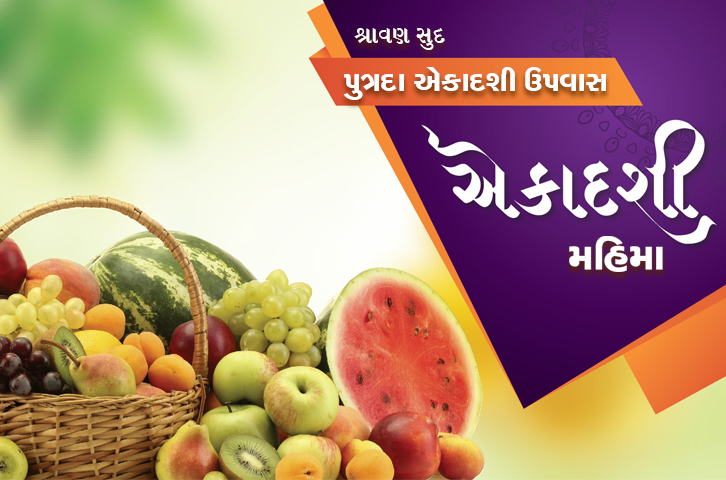Ekadashi Mahima – (પુત્રદા એકાદશી વ્રત કથા – શ્રાવણ સુદ – ૧૧ )

ગુજરાતી
ભવિષ્યપુરાણ અનુસાર, એકવાર, એક ‘મહીજિત’ નામનો રાજા, જે ‘મહિષ્મતી’ ના શક્તિશાળી રાજ્યના શાસક હતા. અઢળક સંપત્તિ અને સમૃદ્ધિ હોવા છતાં, રાજા હંમેશાં ચિંતિત અને નાખુશ રહેતા કારણ કે તેને કોઈ સંતાન ન હતું. તેમણે વિદ્વાન માણસો, ઋષીઓ અને બ્રાહ્મણો ની સલાહ લીધી, આખરે સર્વજ્ઞ વિદ્વાન મહર્ષિ લોમેશ પાસે પહોંચ્યો.
ધ્યાનમાં, મહર્ષિએ જોયું કે રાજા મહીજિતની સંતાન ન પ્રાપ્ત થવાનું દુર્ભાગ્યએ તેના પાછલા જન્મમાં થયેલા પાપોનું પરિણામ છે, તેણે કહ્યું હતું કે, રાજા મહીજિત તેના પાછલા જન્મમાં એક વેપારી હતો. એકવાર, વ્યવસાય પર મુસાફરી કરતી વખતે, વેપારી ખૂબ તરસ્યો થયો અને શોધતા એક તળાવ પર પહોંચ્યો. સંયોગે ત્યાં એક ગાય અને તેનું નાનું વાછરડું પાણી પી રહ્યું હતું. વેપારીએ તેમને ત્યાંથી હાંકી મૂક્યા અને પોતે પાણી પીધું. તે જન્મમાં તેના સત્કર્મ ઘણા હતા જેણે પરિણામે તેણે આ જન્મમાં રાજા બનાવ્યા, પણ આ એક પાપકર્મ ને કારણે તે નિસંતાન હતો.
મહર્ષિ લોમેશે તે પછી, રાજા અને રાણીને શ્રાવણ મહિનામાં પવિત્રા એકાદશીના વ્રત કરવાની સલાહ આપી. , જેથી તેના પાપમાંથી મુક્તિ મળી શકે. (‘પવિત્ર’ એટલે પાપમાંથી મુક્તિ મેળવવી). ઋષિ લોમેશ ની સલાહ મુજબ , રાજદંપતીએ ઉપવાસ રાખ્યા અને ભગવાન વિષ્ણુને પ્રાર્થના કરી અને રાતભર જાગૃત રહી ભગવત નામનો જાપ કરતા રહ્યા. તેઓએ બ્રાહ્મણોને સોના, ઝવેરાત, કપડાં અને પૈસાની ભેટો પણ આપી હતી. પવિત્રા એકાદશી વ્રતના ફળ સ્વરૂપે તે પાપમુક્ત થયા અને તેમની ઇચ્છા પૂર્ણ થઈ અને તેમને ત્યાં એક સંસ્કારી પુત્રનો જન્મ થયો.
ભગવાન શ્રીકૃષ્ણ દ્વારા રાજા યુધિષ્ઠિરને એકાદશી વિશેની કથા વર્ણવવામાં આવી છે. આ એકાદશીને પુત્રદા એકાદશી અને પવિત્ર્રોપન એકાદશી તરીકે પણ ઓળખવામાં આવે છે. આ એકાદશીના વ્રતમાં, અધીષ્ટતા ભગવાન શ્રીધર અને પત્ની કન્તીમતી, નું પૂજન કમળના ફૂલથી કરી નૈવેદ્યમાં માલપુઆ ધરાવવા અને અર્ઘ્યમાં સીતાફળ અને પાદુકા દાન કરવાનો વિશેષ મહિમા શ્રીમદ્ સત્સંગિજીવનમાં બતાવ્યો છે. આ ઉપરાંત ભગવાનને વિશેષ રૂપે પવિત્રા (સુતરના દોરા બનાવેલ) અર્પણ કરવાની પરંપરા આદીકાળથી ચાલી આવે છે, સત્યયુગમાં પવિત્રા મણીમય, ત્રેતામાં સુવર્ણનાં, દ્વાપરમાં રેશમના અને કલિયુગમાં સુતરના ધરાવાય છે. શાસ્ત્રમત પ્રમાણે પવિત્રા એકાદશીના દિવસે ભગવાન ભક્તોના વિવિધ ભાવથી અર્પણ પવિત્રા સ્વીકારીને ભક્તોને કૃતાર્થ કરે છે.
English
As per Bhavishya Purana, once, there was a ruler named ‘King Mahijit’, who ruled the powerful Kingdome of ‘Mahishmati’. Though having all the wealth and prosperity, king always was worried and unhappy as he had no children. He sought counsel of learned men, sages (rishis) and Brahmins (priests), ultimately reached the omniscient learned Rishi Lomesh. In meditation, Rishi found that King Mahijits misfortune was a result of his sins in his previous birth, he told that Mahijit was a merchant in his previous birth. Once, while travelling on business, the merchant became extremely thirsty and reached the pond. There a cow and her calf were drinking water. The merchant drove them away and himself drank the water. There was his Sat karma (good deeds) which made him King in this birth but also Paap karma (Sin)has resulted in his childlessness. Rishi Lomesh, then, advised the King and the Queen to observe fast in month of Shraavana on Holy day of Pavitra Ekadashi to get rid of his sin. [ ‘Pavitra’ means to get pious, get rid of sin]. As advised, the royal couple kept a fast and offered prayers to the god Vishnu and kept vigil throughout the night piously chanting his divine name. They also gave gifts of gold, jewels, clothes and money to the Brahmins. Their wish was fulfilled when a handsome son was born to them to subsequently become the heir to their kingdom. The legend about Ekadashi is narrated by the Bhagwan Shree Krishna to the King Yudhishthira . This Ekadashi is also Known as Putrada Ekadashi and Pavitropana Ekadashi. In this Ekadashi vrata, puja of Adhishtata Lord Sridhar and his wife Kantimati with lotus flower, also offering Malpua( Kind of Sweet) in the offering ‘Sitafal’ (custard apple) as Arghya and donating paduka(Footwear) has the special glory as shown in Srimad Satsangijivan. Apart from this, the tradition of offering special Pavitra (made of cotton thread) to the Lord has been going on since time immemorial. According to the scriptures, on the day of Pavitra Ekadashi, the Lord fulfills the devotees by accepting the offerings from the devotees with different Spirit of faith.
